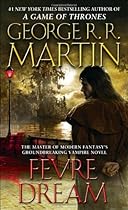Fevre Dream – by George R. R. Martin
 Fevre Dream, by George R. R. Martin (Simon and Schuster, 1982):
Fevre Dream, by George R. R. Martin (Simon and Schuster, 1982):
Vampire-as-alien tale featuring a vampire subculture rather than a solitary predator. Set in the heyday of the Mississippi steamboats, this novel centers on Joshua, a vampire who, orphaned in childhood, grows up believing himself an aberrant human being.
Eventually he realizes that he is neither human nor supernatural (religious symbols have no effect on him), but a representative of a species that combines features of the legendary werewolf and vampire. Aside from vulnerability to sunlight, Joshua leads a more or less “normal” life except for a few nights each month.
At those times his uncontrollable bloodlust drives him to kill human victims, despite his best intentions. By the time he eventually finds members of his own race, his remorse compels him to seek an alternative to killing. He invents a potion that substitutes for blood, freeing himself and his followers from the “red thirst” or “fever” (hence the name he bestows on the steamboat he buys).
Fevre Dream is the first distinguished “good vampire / bad vampire” novel, a subgenre that has since produced a number of specimens. Joshua's rivals want to continue ruthless exploitation of their prey rather than living in harmony with the human race. Joshua's partner, steamboat captain Abner Marsh, provides the viewpoint through which we learn about the vampire race.
Abner, as he grows from horror at Joshua's nature to understanding that vampires, like human beings, are individuals with both good and evil traits, serves as surrogate for the reader who longs for contact with an alien mind. When Joshua remarks that his kind have never before revealed the truth about themselves to one of the human “cattle” they feed on, Abner counters, “Well, I never lissened to no vampire before neither, so we're even. Go on. This here bull is lissenin'” (p. 144). Martin's nineteenth-century setting enriches the story without eclipsing the fantastic components, as Yarbro's historical backgrounds sometimes do.